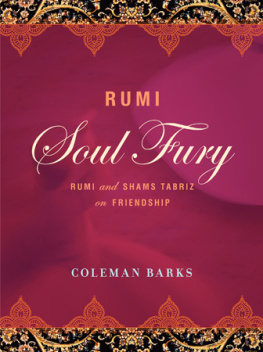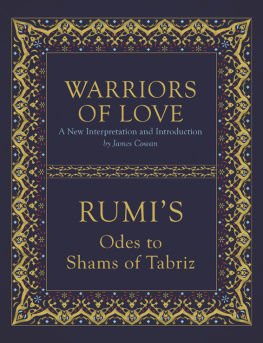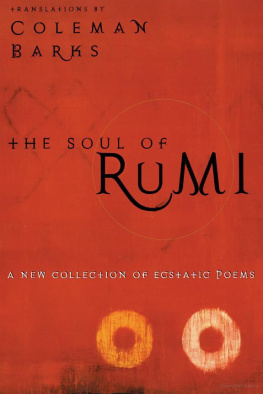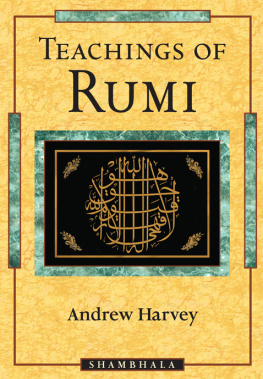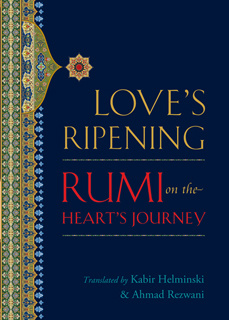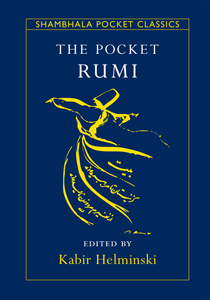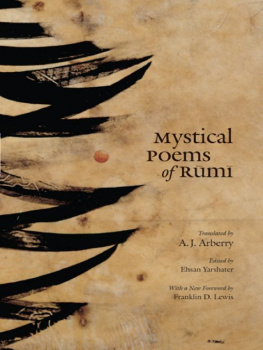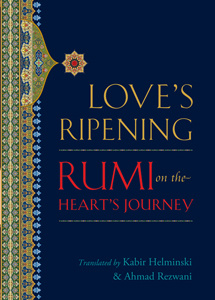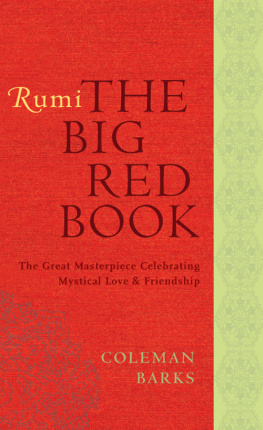Coleman Barks - Rumi: The Book of Love
Here you can read online Coleman Barks - Rumi: The Book of Love full text of the book (entire story) in english for free. Download pdf and epub, get meaning, cover and reviews about this ebook. publisher: HarperCollins, genre: Art. Description of the work, (preface) as well as reviews are available. Best literature library LitArk.com created for fans of good reading and offers a wide selection of genres:
Romance novel
Science fiction
Adventure
Detective
Science
History
Home and family
Prose
Art
Politics
Computer
Non-fiction
Religion
Business
Children
Humor
Choose a favorite category and find really read worthwhile books. Enjoy immersion in the world of imagination, feel the emotions of the characters or learn something new for yourself, make an fascinating discovery.
- Book:Rumi: The Book of Love
- Author:
- Publisher:HarperCollins
- Genre:
- Rating:4 / 5
- Favourites:Add to favourites
- Your mark:
- 80
- 1
- 2
- 3
- 4
- 5
Rumi: The Book of Love: summary, description and annotation
We offer to read an annotation, description, summary or preface (depends on what the author of the book "Rumi: The Book of Love" wrote himself). If you haven't found the necessary information about the book — write in the comments, we will try to find it.
Rumi: The Book of Love — read online for free the complete book (whole text) full work
Below is the text of the book, divided by pages. System saving the place of the last page read, allows you to conveniently read the book "Rumi: The Book of Love" online for free, without having to search again every time where you left off. Put a bookmark, and you can go to the page where you finished reading at any time.
Font size:
Interval:
Bookmark:
 Australia HarperCollins Publishers (Australia) Pty. Ltd. 55 Avenue Road, Suite 2900 Toronto, ON, M5R, 3L2, Canada http://www.harpercollinsebooks.ca
Australia HarperCollins Publishers (Australia) Pty. Ltd. 55 Avenue Road, Suite 2900 Toronto, ON, M5R, 3L2, Canada http://www.harpercollinsebooks.caNew Zealand HarperCollinsPublishers (New Zealand) Limited P.O. 55 Avenue Road, Suite 2900 Toronto, ON, M5R, 3L2, Canada http://www.harpercollinsebooks.ca
New Zealand HarperCollinsPublishers (New Zealand) Limited P.O.
Box 1 Auckland, New Zealand http://www.harpercollinsebooks.co.nz
United Kingdom HarperCollins Publishers Ltd. 77-85 Fulham Palace Road London, W6 8JB, UK http://www.harpercollinsebooks.co.uk
United States HarperCollins Publishers Inc. 10 East 53rd Street New York, NY 10022 http://www.harpercollinsebooks.com
He studied it with his fathers former student, Burhanuddin Mahaqqiq. They also read Sanai and Attar together, and Burhan led the young Rumi on several consecutive chilla s, forty-day fasting retreats. Burhan was himself an eccentric hermit majestically unconcerned with beliefs and lineages. He seems to have prepared Jelaluddin well for the galvanizing event of the young mystics life, his meeting with Shamsi Tabriz. In late October of 1244 Rumi was thirty-seven. Shams was twenty, maybe thirty, years older.
Their meeting and subsequent sohbet (mystical conversation) generated fresh stories and ecstatic icons for the world of mystical awareness and love. Their Friendship is one of the great mysteries. Rumis poetry is heard as continuing resonance from That. Their separation on the physical plane occurred four years later on December 5, 1248. There is disagreement now as to how Shams disappeared. Franklin Lewis claims that the rumor Shams was murdered by jealous disciples of Rumi arrives late, circulates in oral context, and is almost certainly groundless.4 What we know for sure is what we have, the poems so filled with grief and ecstatic sentience.
All the biographical scenarios, whichever one chooses, are without sufficient evidence to be authoritative. No matter. We can let that detective story rest awhile. We have the Shams, the Masnavi, the letters, Discourses, sermons, the Rubaiyat, a generous plenty! After Shamss death or disappearance, Rumi lived twenty-six years tending soul growth in the dervish community around him and leaving us a prodigious legacy. He spoke the poetry spontaneously. It was taken down by scribes, and he revised it later in manuscript.
Rumi was married twice; his first wife, Gowhar Khatun, died young. She bore two children, Sultan Velad and Allaedin. Rumi had two children also with his second wife, Kira Khatun: Mozaffer, a son, and Maleke, a daughter. The central enigma of Rumis life, of course, is Shams Tabriz, the electrifying, eccentric wanderer with the charisma of a desert wind, who knelt and prayed for a companion on his own level of attainment. A voice came, What will you give? My head. Jelaluddin of Konya is your Friend.
He said later that he came to Rumi when Rumi was ready to receive his secret. But it was observed of Rumi and Shams that one could not tell who was the teacher and who the disciple. Thoreau went to the woods to simplify and find what was most deeply his. I did not want to live what was not life. Living is so dear. Some sentences sear the soul free of communal and personal habits, the situation were born within.
When Shams pushes Rumis books into the fountain at their first meeting, including his father Bahauddins soul notes, he says, Now you must live what youve been reading and talking about. Rumi relinquishes his books, and he and Shams go into retreat. Rumi asks for burning. Shams says, I am fire. It is that which refines the poems to their daring intensity and courage, to their setting out into unknown regions, these heart-quadrants that are so subtle and multivalent. Why should I seek more? I am the same as he.
His essence speaks through me. I have been looking for myself. After this soul-merging with Shams, Rumi found another living friend with whom to do the heart-opening work, Saladin Zarkub the goldsmith. Saladin was an old man (the poems become more quiet and tender), and after Saladins death, Husam Chelebi, Rumis scribe, became the friend of his heart. They produced the six books of the Masnavi. Rumi died as the sky turned deep red at sunset on December 17, 1273.
There were minor tremors, like stomach grumblings. Patience, old earth! Rumi called out. Youll have your sweet morsel soon!
The distortions are mine. You can never be sure, though, what is, and is not, transmitted in collaborative translation, or any translation, version, imitation, whatever you choose to call the bringing-over from one language and time into another. Its always a failure of one magnitude or another. Think of translating Hamlet into Chinese, or Faulkner into Farsi, Poe into Polish. It cant be done, but the attempt must be made. The same with Rumi into American.
Ill try to describe what I do. I look at one text in English and write another. For example, I did a collection of poems by a fourteenth-century Kashmiri woman named Lalla, or Lalleshwari. The Naked Song poems came down in oral tradition for four hundred years before they were written down at all, some in Sanskrit, some in Kashmiri, some in both. Hundreds of lines from her poems are still actively a part of Kashmiri conversation. I dont read Kashmiri or Sanskrit, but Sir George Grierson and Lionel Barnett of the Royal Asiatic Society did read those languages.
They published a book in 1920, Lalla-Vakyana, The Wise Sayings of Lal Ded, A Mystic Poetess of Ancient Kashmir. I looked at their book and the others listed in the back of mine to produce the text. I hope the words in it are some kin to Lallas daring, darling, wandering songs. Its a process of attunement for me. There are many mystics that I cannot make versions of, because I dont feel connected enough to their words. Lionel and Sir George were not trying for that kind of closeness.
On the contrary, they cultivated scholarly distance. Detachment was valued, and I am very grateful for their diligence and for the lifelong British stamina and scholarly passion of Reynold Nicholson and A. J. Arberry, the Cambridge Islamicists who brought Rumi to the West with their translations from the 1920s through the 1950s. My friend John Moyne has also sent me texts to work with over the years, and Nevit Ergin is another treasure. (Nevit Ergins translations are available from Words Distribution, 7900 Edgewater Drive, Oakland, CA 94621. (Nevit Ergins translations are available from Words Distribution, 7900 Edgewater Drive, Oakland, CA 94621.
Font size:
Interval:
Bookmark:
Similar books «Rumi: The Book of Love»
Look at similar books to Rumi: The Book of Love. We have selected literature similar in name and meaning in the hope of providing readers with more options to find new, interesting, not yet read works.
Discussion, reviews of the book Rumi: The Book of Love and just readers' own opinions. Leave your comments, write what you think about the work, its meaning or the main characters. Specify what exactly you liked and what you didn't like, and why you think so.


